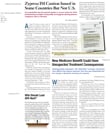The endocrine complications of psychopharmacological agents in children demand particular attention because the patients are still developing.
One of the oldest psychotropic drugs has well-known effects on the thyroid gland, said Harold Carlson, M.D., head of the division of endocrinology at Stony Brook University in New York.
“Lithium inhibits the release of thyroid hormone from the gland, causing a fall in serum levels, and that leads to a rise in serum thyroid stimulating hormone [TSH],” said Carlson recently at seminar on child psychopharmacology sponsored by the American Academy of Child and Adolescent Psychiatry. Increased TSH then stimulates thyroid growth and nodularity.
These effects are reversible, so Carlson recommends checking baseline serum TSH and then retesting at one month, six months, 12 months, and annually thereafter. Other mood stabilizers like valproate and quetiapine appear to affect TSH or hormone levels, and when combined with lithium, may affect thyroid function more strongly than any single drug. Patients taking lithium and either valproate or quetiapine should have serum TSH monitored every three months for the first year in treatment.
Parents of children taking stimulants for ADHD often worry that the drugs are stunting their child's growth. Slower yearly growth during the first years of stimulant therapy is only temporary, however.
“Their growth is not permanently stunted, and there's some indication that their growth period may last longer,” said Carlson. “Slower growth may be related to decreased food intake while on stimulants.”
One study of 97 patients, published in the April 2000 Journal of the American Academy of Child and Adolescent Psychiatry, found that methylphenidate-treated boys reached adult heights and weights not significantly different from their unmedicated brothers and randomly selected classmates.
Physicans should measure a child's height and weight before starting stimulant therapy and plot new measurements every six months, Carlson advised. He urged physicians to refer to a pediatric endocrinologist to check for other disorders if the child's height decreases by more than 20 percentiles.
More serious issues may arise as adverse effects of antipsychotic drugs, which may elevate serum prolactin. Conventional antipsychotics act as dopamine (D2) antagonists and thus raise prolactin levels. Atypical antipsychotics vary in their effect, depending on their affinity for the D2 receptor and their ability to dissociate from it. Risperidone elevates prolactin the most, aripiprazole the least, said Carlson.
Normal prolactin levels are 20 to 25 ng/ml. Higher levels can induce a number of symptoms: galactorrhea or menstrual irregularities in women, erectile dysfunction in men, breast enlargement or decreased libido in both genders, or failure to enter or progress through puberty.
Elevated prolactin levels may decrease over time, even with continued antipsychotic use, but symptoms should be taken seriously, commented Stephen LaFranchi, M.D., in an interview.
“If a child doesn't have any clinical features of hyperprolactinemia, then there's no need to measure, but if galactorrhea or menstrual irregularities appear, then it's best to test for serum prolactin levels,” said LaFranchi, a professor of pediatrics at Oregon Health and Science University. “You try to strike a balance between the effects of the drug and the clinical problem. If galactorrhea is infrequent or intermittent, perhaps it's not a problem. But if there's no menstrual period for six months, maybe a trial period off the drug is appropriate—although it's a significant clinical issue to stop the drug.”
Clinicians should ask about possible symptoms at every visit, said Carlson. Levels above 200 ng/ml warrant a referral to an endocrinologist and an MRI to rule out a pituitary tumor.
Weight gain causesd by antipsychotics is especially troublesome in an era when pediatric obesity is already on the rise. Combined with abnormal blood glucose levels or high blood lipid levels, being over-weight increases the risk that children will develop diabetes. Clozapine and olanzapine appear to increase weight the most, ziprasidone the least. Concurrent valproate or lithium therapy also increases risk. Patients exhibiting polyuria or polydipsia require close monitoring, said Carlson.
“While weight gain plays a role in some cases, there may also be direct effects of the drugs on insulin secretion and action,” said Carlson. He recommends fasting lipid tests at baseline, three months, and then yearly for all patients. Fasting glucose tests should be done at baseline and every six months. Patients who have high body mass index or rapid weight gain on antipsychotics, have a family history of hyperlipidemia or coronary heart disease, or are taking olanzapine or clozapine should have lipids checked quarterly.
“If weight gain is 5 percent or greater, consider switching medications to one less associated with weight gain,” said Carlson.“ And offer diet and exercise counseling. Even losing five or 10 pounds can make a difference in whether a child gets diabetes.”
The study, “Predictors of Adult Height and Weight in Boys Treated With Methylphenidate for Childhood Behavior Problems,” is posted online at<www.ncbi.nlm.nih.gov/entrez/query.fcgi?cmd=Retrieve&db=pubmed&dopt=Abstract&list—uids=10761355>.▪
